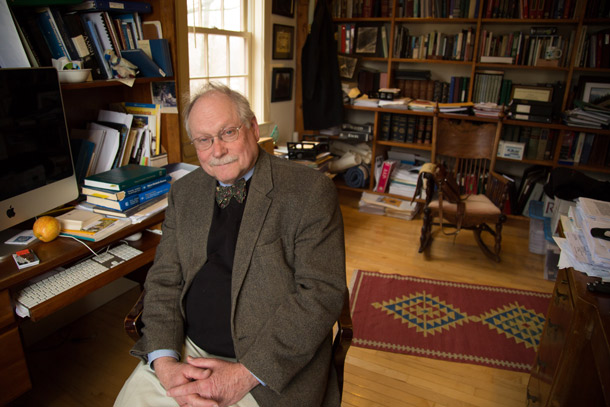The Clinic for Special Children in Strasburg, Pennsylvania, is geographically nestled within the Old Order Amish and Mennonite populations of Lancaster, County. Similarly, EMU and the Heartland Clinic in Dayton, Virginia, are surrounded by Old Order and Conservative Mennonite populations. All parties have a common interest in the “Plain” communities’ needs for quality healthcare.
“One of the most valuable things about this clinic is we know families and patients over the long-term and we remember the unsolvable cases,” explained co-founder Holmes Morton, MD, to a visiting delegation of approximately 25 representatives from Eastern Mennonite University and Heartland Clinic on Feb. 9.
The Strasburg clinic largely serves the Amish and Old Order Mennonites who have rallied around the clinic and, in a way, accepted it into their fold. This population has a relatively small genetic pool, which makes it at high-risk for certain genetic disorders. The clinic makes a special effort to catch the children with genetic conditions early in their lives, offering comprehensive care that it tries to keep affordable.
The EMU/Heartland group came to the Strasburg clinic to explore whether the Old Order and Conservative Mennonite communities in the Shenandoah Valley might benefit from a similar research-based clinic in the vicinity of Harrisonburg.
In both Pennsylvania and Virginia, the rather insular, intentionally non-modernized Anabaptist-rooted communities have descended from small founder populations and gain few outside members, resulting in a limited genetic pool. As a result, these populations are at high-risk for certain inherited genetic disorders, such as Maple Syrup Urine Disease and Glutaric Acidemia (GA-1).
Since its founding in 1989, the Strasburg clinic has become a leader in the field of rare genetic disorders. People from all over the world come to the tiny, barnlike clinic in the middle of a cornfield to be treated.
To do this, Holmes Morton and co-founder Caroline Morton (his wife and board member) believed that they needed a space where clinical care would be supported by on-site laboratory services.
To install and run the expensive laboratory equipment, the Mortons were prepared to take out a second mortgage on their own home – a plan they got to shelve when a 1989 Wall Street Journal article thrust them in the public eye. The result was a flood of donations by readers, including a donation of equipment valued at $250,000 from Hewlett-Packard.
The clinic is a 501(c)3 nonprofit, with just over a third of the clinic’s operating budget coming from yearly auctions put on by the community. Another third comes from donations and the rest is from collaborations, an endowment and a small percentage from patient fees. The clinic’s operating budget is currently $2.6 million dollars a year.
In the Shenandoah Valley, the Heartland Clinic already serves Old Order and Conservative Mennonite populations in the Harrisonburg/Dayton area for services such as physical therapy, dental care, childbirth, and general medical checkups. Though Plain populations in Virginia are also likely suffering from inherited genetic disorders, Heartland doesn’t have the resources or facilities to do the kind of genetic testing and treatment the Clinic for Special Children is offering.
The visiting EMU/Heartland group learned of ways that the clinic is collaborating with undergraduates from nearby Franklin & Marshall College (F&M). As they study the genetic disorders presenting at the clinic, these students are getting opportunities to see how new proteins function – an opportunity that is not even available in many medical schools, said Robert Jinks, an F&M professor of biology.
With the completion of the renovations on the Suter Science Center, EMU will have the facilities to do genetic research, but it would need to add equipment costing as much as $100,000. However, the academic opportunities for students to study genetic diseases – some of which haven’t even been discovered yet – could be invaluable, said Roman Miller, director of the MA in biomedicine program at EMU.
“We do have a vested interest in this in this,” he said, in that this kind of research is “academic education being expressed in practical ways.” Miller added that the project fits EMU because it connects with the university’s mission to offer “ healing and hope in our diverse world.”
EMU, Heartland and the Clinic for Special Children are at the beginning of considering whether cooperating on this project would be desirable and possible. But as the group listened to presentations from Jinks about the current work at F&M, were given a tour of the building, and heard more about what kind of services the clinic offers, it became clear that the parties plan to continue having serious conversations.
As Morton observed, “Part of what I see in this collaboration is an opportunity for you to do for your community to do what we have done here.”
The group that explored the work of the Clinic for Special Children in Strasburg, Pennsylvania, on Feb. 9, included the following (all associated with EMU, except for the Heartland and Strasburg clinic staffers): back row, from left, philosophy/theology professor Christian Early, president Loren Swartzentruber; biology professor Jeffrey Copeland; second row, Heartland board member Jonathan Martin; MA in biomedicine consultant Joseph Longacher; nursing instructor Kate Clark; nursing professor Don Tyson; Strasburg administrator Adam Heaps; graduate dean Jim Smucker. Front row, Heartland board member Neil Beery; Heartland physician assistant Jonathan Shomo; biology professor Roman Miller; marketing director Andrea Wenger; advancement vice president Kirk Shisler. (Photo by Kara Lofton)

